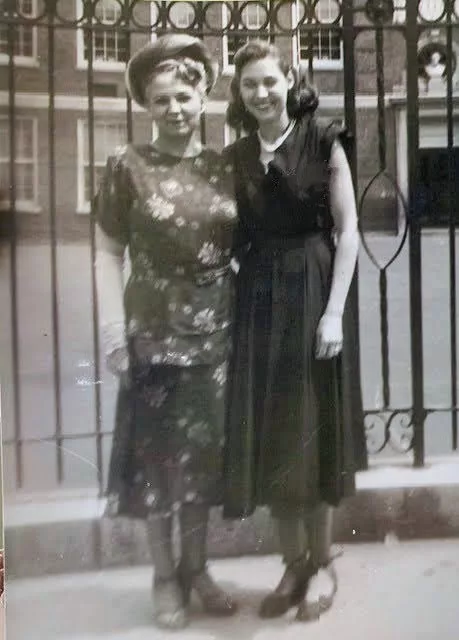By Patricia Chadwick
 It was Mother’s Day weekend 1986, and I had left the madness of the world of investing behind in New York City to spend time with my mother in Boston. “I want to buy a house on the ocean,” she said with an air of confidence the moment I walked into the house. It was as though she had already made up her mind. “Will you go in on it with me?”
It was Mother’s Day weekend 1986, and I had left the madness of the world of investing behind in New York City to spend time with my mother in Boston. “I want to buy a house on the ocean,” she said with an air of confidence the moment I walked into the house. It was as though she had already made up her mind. “Will you go in on it with me?”
Mother seemed on top of the world. Her journey from the life of a nun, one she had been duped into accepting for close to twenty years—to that of businesswoman had been nothing short of spectacular. A woman with a prodigious vocabulary and an immense knowledge of literature and history, she credited her teachers at Cambridge High and Latin. After a year at Boston University, when she joined “The Center,” she immersed herself in the study of Ancient Greek, Latin, and even Aramaic. She left the confines of “The Center” a couple of years after I had been kicked out, desperate to make up for lost time, to reinstate herself in the role of mother and to be with me. She did what was necessary to make a living, at first cleaning houses for those who could afford her services. Perhaps having lived the life of servitude for two decades as an obedient nun, she had the grace to accept that lowly position without rancor or complaint. It was her nature to view the world as full of opportunity. From housekeeper, she took on the role of nanny for the infant daughter of a brilliant couple getting their PhDs at Harvard and when, a couple of years later, the couple had another daughter, they asked both my parents to be her godparents. That bond remains between the two families to this day. Then, after a stint in the world of real estate, my mother became the manager of a branch of Cambridge Savings Bank, with responsibility for approving—or not—all personal loans. She had a sixth sense and was proud to boast that no loan she had ever made went bad.
It was sometime in the late 1970s, or perhaps the early 1980s, that Mother became the secretary to the owner of a small manufacturing company—a firm that manufactured wooden pallets, a forklift-ready stock item for every warehouse that need to move cartons of products. Within a couple of years, she was handling the day-to-day affairs of the business, from negotiating leases to hiring employees and managing sales. Her boss rewarded her handsomely, and by the time she was in her late fifties, Mother was making more than $100,000 annually, the equivalent of more than a quarter of a million dollars today.
I was honored to have inherited her business acumen, which she, in turn, credited to her own mother, Laura Miller. Laura’s pregnant mother had succumbed to the 1918 flu epidemic, leaving behind a husband and four young daughters in Leondardtown, Maryland, a small town on the Potomac River. Laura, the eldest of the four, and twelve years of age at the time of her mother’s death, left school in the sixth grade to raise her siblings, the youngest of whom was just two years old.
Eight years later, when Laura married Bill McKinley—a World War I veteran she met in Washington, D.C—and moved north to his home in Cambridge, Massachusetts, she brought her youngest sister, then ten years old, to live with them. Bill had been stationed in France during the last year of the war and was active in the local VFW. Laura, in turn, joined the “8 and 40” the women’s auxiliary group, and soon began her public speaking career.
Within a few years, Laura became the organization’s parliamentarian, and in that role, she committed to memory Robert’s Rules of Order. Over the next fifty years, she traveled to each of the lower forty-eight states, as the lead speaker at the organization’s annual conference. She made an impression—this woman who was about five feet tall in her high heels. Her speaking voice was strong, her diction perfect, and her vocabulary sophisticated. Well into her eighties, she never lost her poise nor faltered over a word. I understood why my mother was so proud of her.
Mother had two vacation loves—one was her annual trip to Europe with Daddy, the focus of which was twofold. Ostensibly, they were visiting, over and over again, the great Catholic cathedrals of Italy, France, Germany, and England. Almost as importantly, they were exploring the small towns on the outskirts of those cathedral cities. Seldom making either accommodations or restaurant reservations in advance, they would drive until they came to a village that appealed to them. Rarely were they disappointed. My husband and I curated our own vacations around many of the sites they most loved.
When not traveling, Mother was happiest by the sea. She would reminisce about her childhood summers with her grandmother in Cohasset, a seaside town on the south shore of Massachusetts, while her own mother remained back in Cambridge with her younger sister.
Now in her late fifties, she wanted her own place by the sea. “I love Maine,” she said. “I want to see the ocean from my bed. I have a place in mind.” She had done her homework and, together with a couple of my sisters, we headed north on that Saturday before Mother’s Day to Wells Beach on the southern coastline of Maine to look at a particular four-unit condominium building that had been recommended to her by a real estate agent whom she trusted. It was love at first sight, so to speak, for Mother, as she stood on the balcony of the three-bedroom-apartment and scanned the Atlantic Ocean in front of her. By the end of the day, it was ours.
This column is an excerpted and edited chapter from my new book, Breaking Glass: Tales from the Witch of Wall Street. The book is now available at bookstores and online. The audio version of the book will be available in about a month.
Patricia Chadwick is a businesswoman and an author. Her second memoir, Breaking Glass, with the subtitle: Tales from the Witch of Wall Street, is coming public on May 14, 2024. It tells of her “growing up” and succeeding in what was then the all-male bastion called Wall Street. Her new book is a sequel to her first Memoir, Little Sister, the story of her childhood in a religious community-turned-cult. www.patriciachadwick.com


